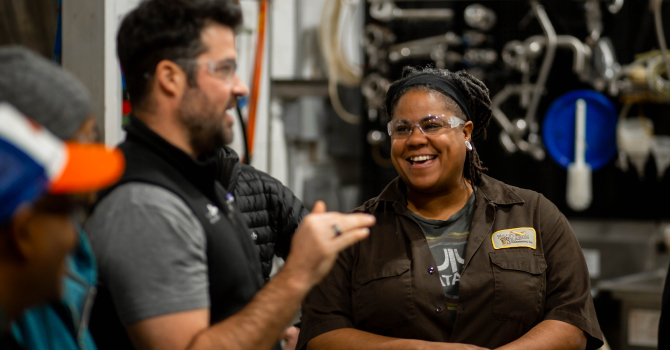
Seven years after establishing Trillium Brewing Company, co-founder JC Tetreault said the Canton, Massachusetts-based craft brewery was not living up to his intention for the business to “being a very good reflection of the broader community around us.”
“If you look around today, we’re not exactly a great reflection of that community but we’re building toward that,” Tetreault told guests during a reception for the launch of Wonderful Complex Individual, a beer brewed in collaboration with the Urban Farming Institute of Boston. “This project is an effort to help outwardly express that and inwardly express that.”
The program was born out of a conversation with Brewers Association diversity ambassador Dr. J. Nikol Jackson-Beckham, who recommended partnering with a community organization.
Enter the Urban Farming Institute of Boston (UFI), an organization dedicated to promoting farming in urban neighborhoods through farmer training, land access and public education and policy.
Trillium invited Jackson-Beckham and UFI employees and volunteers to help brew a 50-barrel batch of Wonderful Complex Individual, a stout with sweet potato, Madagascar vanilla, cinnamon and nutmeg.
The beer was released Friday, and Trillium is donating $1 from each draft pour and $2 from every 4-pack to UFI. The beer is available on draft and in package at Trillium’s Canton, Fort Point and Fenway locations.
“This has been the easiest partnership and collaboration in the world,” UFI president and CEO Patricia Spence said. “It’s beer and good food, too.”

Wonderful Complex Individual grew out of a viral social media challenge in response to a racist email sent to beer blogger Chalonda White, known on Twitter as Afro Beer Chick, telling her she had no business writing about beer as a black woman. White posted a screenshot of the epithet-laden message to Twitter and Jackson-Beckham retweeted it and then invited her followers to join a conversation.
“I want to channel this feeling to something positive. I want to demonstrate what an inclusive #craftbeer community looks like,” Jackson-Beckham wrote. “1. Take selfie. 2. Tell us something about your wonderful, complex, individual self. Tag your post wirth #IAmCraftBeer.”
When thousands of beer fans and beer industry professionals shared facts and photos, Jackson-Beckham knew she wanted to grow the movement into something more.
“When #IAmCraftBeer was hashtagged and it was out here, it was certainly about representation, saying ‘I’m this person, and I’m also craft beer,’” she told Brewbound. “But when I turned it around for these breweries and proposed a collaborative brewing project, I said ‘Well, what if we think of #IAmCraftBeer as an introduction, like I am craft beer, nice to meet you.’”
The beer industry and its consumers have been predominantly white and male. As those consumers consume less or seek other alcoholic beverages, diversification may help the industry as it seeks to maintain growth.
In an effort to bring more women and people of color into craft beer, the BA formed its Diversity Committee in 2017. A year later, the trade group appointed Jackson-Beckham as its first-ever diversity ambassador. In addition to her work with the BA, Jackson-Beckham is a communication studies professor, executive director of non-profit Craft x EDU, and inclusion and equity strategist for Craft Beer For All.
“One of the first things that I am often asked when I tell people what I do is ‘Why beer? You seem like this activist-y person, you work as a college professor. Why beer?’” she said. “For me, it always comes down to opportunities. When I am asked ‘How bad is the diversity problem in craft beer?’ I say we don’t have a problem, we have a lot of opportunities though.
“And when I ask people to be engaged and to further this effort, what I want them to do is become opportunity makers, and so what I see us doing today is taking advantage of a rather unique set of opportunities.”
Jackson-Beckham pointed to the beer industry’s geographic reach and its numerous job opportunities as avenues for engagement.
“The craft brewing industry is genuinely national — 85% of drinking age adults live within 10 miles of a craft brewery, so we are everywhere,” she said. “We’re not concentrated in any part of the country. We also are an industry who has solid job opportunities for people with GEDs and people with PhDs.”
For Trillium’s part, HR director Danielle Clark Cole told Brewbound the company attends diversity job fairs across the Boston area to get in front of candidates who might not otherwise seek out craft brewing jobs. Her pitch often involves appealing to candidates’ interests: “What do you want to do? Because I bet we have a job like that.”
Clark Cole also said the company has worked to streamline its interview process to guarantee that all candidates are evaluated equally, and not just on a nebulous quality such as being a “culture fit.”
In Chicago, Revolution Brewing incorporated #IAmCraftBeer’s ethos into its annual “We Are Family” fundraiser for non-profit organization Chicago House.
“It’s a cause we’re passionate about — access to housing and healthcare and career services for disenfranchised members of the LGBTQ community, many of them with HIV or AIDS,” Revolution communications manager John Carruthers told Brewbound. “Dr. J asked us to think of causes which speak to home and community, and this really fit that spirit.”
In addition to collaboration projects at breweries such as Trillium, Revolution and Philadelphia-based Love City Brewing, the #IAmCraftBeer movement has led to meetups in cities across the country.
“I didn’t want it to just be a hashtag,” Jackson-Beckham said. “It felt good, we were all like ‘Yay!’ but I didn’t want it to stop at being a hashtag.”
